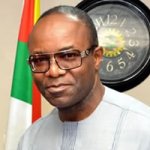At its recent meeting last week, the Federal Executive Council (FEC) approved a whistle blowing programme ostensibly to encourage Nigerians to report suspicious financial dealings without the fear of repercussions. A popular practice universally established in many advanced systems, the novel practice in Nigeria is expected to strengthen the fight against corruption.
While briefing reporters after the meeting, the Minister of Finance whose ministry originated the idea, Mrs Kemi Adeosun, seemed excited about the initiative. She described a whistle blower as any person who voluntarily discloses information in good faith about a possible misconduct or violation that has occurred, is ongoing, or is about to occur. According to the approval given by the FEC, the whistle blower stands to gain a minimum of 2.5 per cent and a maximum of 5 per cent of the recovered loot, although elsewhere, the commission for whistle blowing is 10 per cent. The minister explained that this is a temporary arrangement pending the final details to be worked upon by the National Assembly.
To be sure, the job of the whistle blower could prove in many instances to be tough, dangerous and life threatening, especially when powerful functionaries of the government and conglomerates are involved. This is the reason governments requiring their services anywhere in the world must prove to be sincere and capable of offering protection to the whistle blower whose lives and livelihood may be on the line.
What will spur the whistle blower to risk his or her life? Is it the love for country or the love of compensation? For whistle blowers that are motivated by love for their country, the government must live up to its billing as a competent protector with commensurate appreciation for the altruistic sacrifice being made by the whistle blower who decided not to team up with felons who may offer him or her a more lucrative pay to keep sealed lips. But whistle blowing is not always about money, nor is it restricted to politicians or public offices, so the government has to widen its scope to include all those practices that tend to sacrifice the public interests for the advantages of a criminal few.
There are many instances of criminal compromises in the agencies that are empowered to supervise and enforce compliance with certain standards. It is simply exasperating to expect that whistle blowers will succeed where these agencies have arguably recorded embarrassing failures. The proceeds of corruption may not necessarily be monetary; they may come in the form of land, cars and so on. The big issue in this new initiative in the fight against corruption is protection for the whistle blower. A government that wants to encourage whistle blowing must be impartial and must inspire confidence in the people.
It is easy to see that the idea of whistle blowing may have occurred to the FEC because of its frustration with the failures of the Independent Corrupt Practices and other Related Offences Commission (ICPC) and the Economic and Financial Crimes Commission (EFCC). Some cynical observers have argued, and not without valid reasons, that corruption has increased in spite of these agencies that are expected to check its virulent and pervasive spread. The Federal Government thus has to do more to make this initiative to have the expected impact on its crusade against corruption. The attitude that it is clean without corruption within its ranks is largely delusional and nothing can be further from the truth. The culture of whistle blowing can only succeed if the complimentary attitude of neutral tolerance is also encouraged whenever the whistle is blown against those in the good books of the government.
It is imperative for the Federal Government to conduct a self examination and accept the truth when it is told against it with equanimity. The office of the Secretary to the Government of the Federation (SGF), for instance, is a powerful one with a heavy responsibility, especially for the direction of the administration, yet this office has been continuously mired in shady deals since the outset of the current Republic. How does anybody blow any whistle against the SGF or the AGF for that matter?
We are apprehensive about the tenor of the fight against corruption, especially now that whistle blowers are coming to its rescue, and can only hope that the Federal Government makes a modicum of success in this novel direction.





